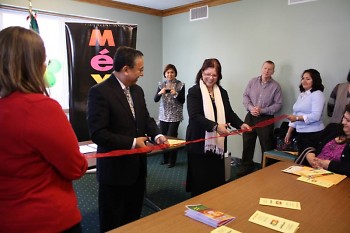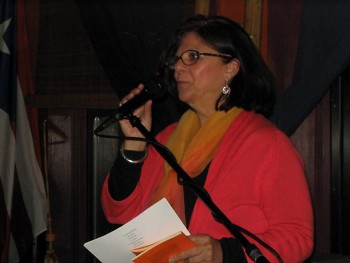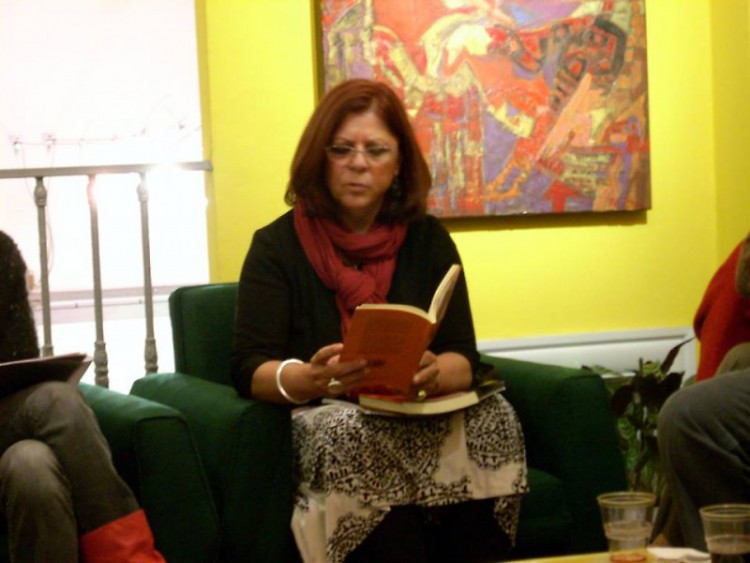Plaza Comunitaria Info

Moret at the signing of the Plaza Comunitaria contract. /Photo courtesy of Zulema Moret

Moret reads her poetry at the Guild Literary Complex in Chicago. /Photo courtesy of Zulema Moret

Zulema Moret reads her poetry in Buenos Aires, Argentina. /Photo courtesy of Zulema Moret

Moret at the signing of the Plaza Comunitaria contract. /Photo courtesy of Zulema Moret

Moret reads her poetry at the Guild Literary Complex in Chicago. /Photo courtesy of Zulema Moret
Whether teaching, writing or organizing film festivals, Zulema Moret is constantly busy. The Argentine-born Grand Valley professor has had a hand in many diverse programs including prayer walks and recently an educational nonprofit, Plaza Comunitaria of Grand Rapids. She worked with the Mexican consulate to get permissions needed to create a program that gives Latino American immigrants the opportunity to earn a diploma from their home country.
As the Coordinator of Latin American Studies at Grand Valley State University, Moret negotiated a contract with the Mexican consulate that allowed them to run Plaza Comunitaria out of Grand Valley, focusing on adult literacy.
Although it's through the Mexican consulate, the program is open to all Latino nationalities. The program is taught by volunteers out of the Steepletown Center.
Moret says there are Latino Americans living in Grand Rapids who still don't know how to read and write. Some never had the opportunity to get even an elementary education, but Plaza Comunitaria helps them earn their high school diploma in Spanish.
"I teach a woman who's a migrant worker from Mexico," Moret says. "She doesn't know how to read or to write. Nothing. And she wants to have a license. She's legal. She has the documents. But she does not know how to read or how to write, so she cannot get a license. And we have many people who are like that."
The students have the option of pursuing traditional English classes after graduating. Moret believes it's important to create a strong cultural foundation for the students before they begin English classes or higher education.
"Then if they want to pursue community college or a university, we have opened the door," Moret says.
There were 19 graduates from the program this year. Moret is extremely proud of the success of Plaza Comunitaria, but says education is just one of the passions in her life. She's also a devout and involved Catholic.
"It's funny. There is a tendency for people to think that you are one thing and you have to be that one thing," Moret says. "But that's not me. I am a professor at Grand Valley, but I also studied with the Dominican sisters."
Moret studied spiritual direction at the Dominican Center. She's not a nun, but Moret is a lay Dominican Associate and Spiritual Director. Many of the prayer programs she runs through the Dominican are specifically aimed at bringing different communities together, such as the bilingual Come Walk With Me event that sought to bring Latino and non-Latino believers together.
"Because God is everywhere," Moret says. "God has no borders. Borders are created by people."
Moret's artistic interests further reflect a disregard for borders. The professor is an avid lover of cinema, especially international films. She has been involved with the establishment of three different film festivals in Grand Rapids.
The first, Chairoscuro International Film Series, brings films from different countries around the world to Grand Rapids. The Grand Rapids Latin American Film Festival was a collaboration between Moret and several professors from other colleges to bring in films from Latin American countries. Moret also hosts screenings and discussions of spiritual films at the Dominican Center.
Moret says these festivals sometimes have her watching 30 or 40 films just to decide what to show.
Somehow with more time available, Moret also writes Spanish poems and prose. She has published several children's books like "Maca se llama mi gata" ["My cat's name is Maca"] and her poetry has appeared in many magazines. She is currently working to get more of her books published along with some English translations of her work.
"Now I want to be read here, in the United States," Moret says.
One of these unpublished novels, “En un país en guerra,”["In a country at war"] is close to Moret's heart. The novel is a very personal examination of countries in war and turmoil. The book specifically looks at the situation in Iraq as well as the political crash in Moret's home country of Argentina.
An educator at heart, Moret ran a creative writing workshop while living in Spain. Now she is talking with Latina women in the community about forming a Spanish poetry reading group in Grand Rapids. She says they will exclusively discuss female poets to reinforce identity.
"I am a feminist and believe in reinforcing women's identities and their self confidence," Moret says. "These are the kinds of projects that give people a lot of things and are alive."
Moret isn't discouraged by the volume of projects she has committed to work on. She sees it as simply part of her life.
"I live alone, so all my free time is addressed to these projects. When I'm not teaching, I do my service. And my service is so rich! It's so full of happiness and joy."
Check out the Plaza Comunitaria website for more information on their programs.
The Rapidian, a program of the 501(c)3 nonprofit Community Media Center, relies on the community’s support to help cover the cost of training reporters and publishing content.
We need your help.
If each of our readers and content creators who values this community platform help support its creation and maintenance, The Rapidian can continue to educate and facilitate a conversation around issues for years to come.
Please support The Rapidian and make a contribution today.